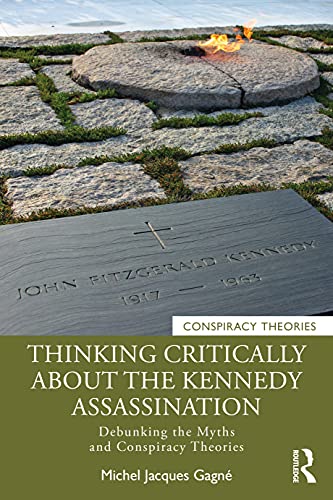Thinking Critically About the Kennedy Assassination
Debunking the Myths and Conspiracy Theories
Michel Jacques Gagné
BOOK REVIEW

The echoes of November 22, 1963, still reverberate in the halls of American history, where the tragic assassination of President John F. Kennedy continues to fuel an unquenchable thirst for intrigue and conspiracy. In Thinking Critically About the Kennedy Assassination: Debunking the Myths and Conspiracy Theories, Michel Jacques Gagné dives into the tangled web of speculation surrounding this pivotal event. With surgical precision and intellectual rigor, this groundbreaking work challenges the prevailing narrative, exposing the myths that have clouded our understanding for decades.
Why does this matter? The Kennedy assassination isn't merely a chapter in history; it's a monumental event that shaped the American psyche, prompting questions about power, truth, and the very fabric of democracy. Gagné's work compels you to confront uncomfortable truths, pushing against the tidal wave of conspiracy theories that insist on cloaking the assassination in shadows and doubts. Rather than allowing you to wallow in sensationalism, he insists on clarity, aiming to illuminate rather than obfuscate. This book isn't just a collection of facts; it's a masterclass in critical thinking that beckons you to engage meaningfully with one of the most debated episodes in modern history.
Armed with meticulously sourced evidence and a keen analytical perspective, Gagné dismantles conspiratorial narratives that have taken root over the years. Each chapter is a journey through sensational claims, expertly dissecting them physics-style, peeling away layers of fiction to reveal the stark simplicity of the tragic truth. He invites you to challenge your own assumptions, urging a shift in perspective that is all too rare in today's polarized landscape.
Readers have voiced a myriad of reactions; some hail Gagné as a beacon of reason in a sea of hysteria, while others cling tightly to their cherished conspiracies. The polarized commentary surrounding this book mirrors the larger societal discourse-those who embrace critical thinking celebrate Gagné's analysis as a necessity in a world drowning in misinformation, while die-hard conspiracy theorists dismiss him as an agent of the establishment. This dichotomy illustrates our collective struggle with the very nature of truth.
In tearing apart the tapestry of conspiracy surrounding the assassination, Gagné not only educates but also incites a moment of reflection. How easily do we surrender our critical faculties? Are we captivated by sensational narratives because they offer comfort or control in chaotic times? As Gagné lays bare the staggering consequences of misinformation, one can't help but feel a deep sense of urgency to cultivate discernment in the face of relentless propaganda.
Throughout the book, a poignant thread emerges: the impact of memory and myth on a national consciousness that grapples with unresolved loss. By connecting the events of a single day to ongoing struggles with governance and civil liberties, Gagné illustrates how our perceptions shape public policy and societal norms. He pushes you to confront the emotional layers at play, invoking a profound sense of responsibility towards an informed citizenry.
But more than a mere scholarly treatment, Gagné's work resounds as a rallying cry for intellectual courage. It beckons you to dive into archival material, to question the status quo, and to reclaim agency in an era where truth has become a commodity. You may feel an impending sense of urgency, knowing that lingering myths about the assassination not only distort history but carry real-world implications today. The stakes have never been higher.
As you navigate through Thinking Critically About the Kennedy Assassination: Debunking the Myths and Conspiracy Theories, you will find that Gagné has crafted not just a book, but a clarion call to action. This isn't merely a scholarly work; it's an invitation to engage in the relentless pursuit of truth. Grab hold of the knowledge Gagné painstakingly provides and become an active participant in the discourse-because in the end, history isn't just about what happened; it's about what we choose to remember. ✊️
The profound implications of Gagné's work reach far beyond the assassination itself. They challenge you to reassess your relationship with the truth in your own life, your community, and the broader world. This book is not just an academic exercise; it's a dynamic, transformative force that empowers you to take control of your understanding. So, what will it be-will you cling to your comfortable myths, or will you step into the light of critical thought? The choice is yours.
📖 Thinking Critically About the Kennedy Assassination: Debunking the Myths and Conspiracy Theories
✍ by Michel Jacques Gagné
🧾 482 pages
2022
#thinking #critically #about #kennedy #assassination #debunking #myths #conspiracy #theories #michel #jacques #gagne #MichelJacquesGagne